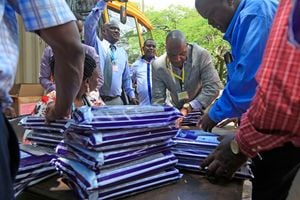
Exam cheating has evolved as the prevalence of the vice has increased significantly over the past 30 years.
For decades, university students have been engaging in examination malpractices, carrying shorthand notes containing answers and known colloquially as “mwakenya”.
Mwakenya is usually hidden in pockets, shoes or other inconspicuous places to avoid detection by examiners. Female students often wrote the notes on their thighs and wore long dresses or skirts to hide them.
However, cheating in exams has evolved. Students nowadays identify the most brilliant among them and sit close to them.
“We make sure he or she sits where the rest of us can copy from him or her,” explained a student at a university in Mombasa.
Once the bright student has been placed in the strategic area, the rest have to wait for the lecturer to leave and then copy.
“Remember that a class of 40 can have five bright students, so each seating formation is led by the brightest,” added another student from a university in Kisumu.
Another student told the Nation that once a lecturer disrupts their seating formation, they are done for.
“This is how most universities break up cheating cartels,” revealed the student from a renowned university in Nairobi.
Although exam cheating isn't new, its prevalence has increased significantly over the past 30 years.
Students from various universities who were interviewed by the Nation said cheating in university exams is fuelled by pressure to succeed, lack of ethics and inadequate supervision.
“We use ChatGPT, which is easy to use. We log into one account as a group,” said Ouma Atieno*, a third year student. Most universities have been unable to detect exam cheating through the use of artificial intelligence.
Other students have resorted to various ingenious methods to cheat in exams. A student from another university narrated how each student contributes Sh1,000 to bribe lecturers.
“Our class has 20 students, which totals Sh20,000. This bribe ensures that the lecturer refrains from active supervision during the exam. Instead, they can sit outside the exam room and only do periodic checks, giving them ample time to cheat,” revealed Wafula Masika*.
Some students resort to using smartwatches equipped with features such as hidden earpieces or discreet notifications, allowing them to receive assistance or prompts without attracting the attention of supervisors.
“Some people resort to using smartwatches during exams. Some have features like hidden earpieces and they have a kind of subtle notification that helps us get help or hints without attracting the attention of invigilators," said Nancy Moraa*.
Exam cheating highlights the pressing issue of the mismatch between graduates’ qualifications and competencies and the evolving demands of the labour market and points to a challenge in harmonising the education and employment sectors.
Dr Alice Kande, acting Director-General of the Kenya National Qualifications Authority (KNQA), says that, despite intensified efforts to combat the proliferation of fake certificates in the labour market, challenges remain due to technological advancements.
“This makes it easier to produce fake documents. KNQA emphasises the importance of authentication processes for employers to verify certificates directly with the issuing institutions,” Dr Kande said.
The authority is now working with technical and vocational education and training (Tvet) institutions to ensure quality throughout the training process leading to certification.
“Our role is to implement policies, cascade policies to institutions, and conduct audits to ensure compliance. But technology has also empowered students nowadays and cheating is on a different level, but the good thing is that we are still able to audit,” said Dr Kande.
Acknowledging the skills mismatch between graduates and the job market, Dr Kande emphasised that close collaboration between educational institutions and industry players is essential to align university curricula with industry needs.
“Feedback from employers indicates that there is a skills mismatch, which is a result of limited industry involvement in curriculum development. KNQA is actively engaging industry players to ensure relevance in curricula,” she added.
Dr Kande said initiatives such as dual education are aimed at bridging the gap by immersing students in industry practices.
“Collaboration is key to effective implementation and industry buy-in is needed to tackle the issue effectively,” she added.
The recent approval of a Recognition of Prior Learning (RPL) policy represents progress in addressing the skills mismatch.
Data released by the Kenya National Bureau of Statistics (KNBS) shows that 19 per cent of the 18.37 million people aged between 15 and 34 were unemployed in the quarter ending December 2023.
The number of unemployed Kenyans rose to over 2.97 million in the same period, highlighting the challenges facing the labour market amid rising inflation and reduced activity in the agricultural sector, the mainstay of the economy.
According to KNBS, “the proportion of young people aged 15-34 who were not in the education system and not working or training for work was 19 per cent”.
The 20-24 age group bears the brunt, with 1.31 million or more than a third of the idle youth falling into this category. In addition, 27 per cent of 20-24 year-olds are neither in education nor in employment.
This situation represents a significant setback for Kenya's labour market, especially given the high number of graduates who lack the skills to start businesses or secure employment.












